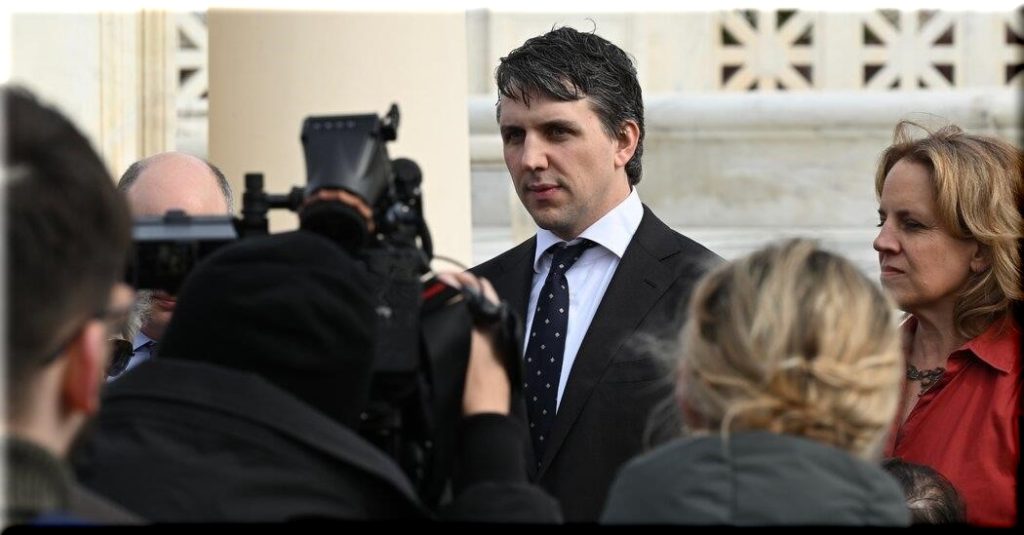Lawyer
Jason Murray, Lawyer: From Clerk to Supreme Court Advocate, Navigating the Colorado Ballot Case
Jason Murray, a lawyer specializing in constitutional and election law, recently found himself at the center of a high-stakes legal battle that could have significant implications for the 2024 presidential election. His legal career, marked by a distinguished path from Supreme Court clerkships to high-profile litigation, has led him to the forefront of this important case.
Murray’s journey to the Supreme Court began with a strong academic foundation and early career experiences that honed his legal skills. He then served as a clerk for both Justice Elena Kagan and Justice Neil Gorsuch, two prominent figures on the Supreme Court, providing him with valuable insights into the workings of the highest court in the land. These clerkships exposed him to the intricacies of constitutional law, including voting rights, a field that would later become central to his work.
Jason Murray’s Legal Career: From Clerk to Supreme Court Advocate
Following his clerkships, Murray transitioned to private practice, becoming a skilled litigator specializing in election law and constitutional law. His experience in these fields prepared him for the complex legal issues surrounding the Colorado ballot case, which he argued before the Supreme Court.
This case, challenging the Colorado Supreme Court’s decision to bar former President Donald Trump from the ballot, presented a critical legal question: does a state have the power to disqualify a presidential candidate from its ballot? Murray, representing a group of Colorado voters, argued that the state had acted within its rights, citing legal precedents and constitutional principles supporting the state’s authority to regulate its elections.
The Colorado Ballot Case: A Turning Point in Election Law?
The Colorado Supreme Court’s decision, based on a state law that limited ballot access, generated considerable controversy and raised important questions about the balance of power between states and the federal government. The Court’s decision, while grounded in state law, also sparked concerns about its potential impact on future presidential elections, raising questions about the potential for states to arbitrarily exclude candidates from their ballots.
Murray’s arguments before the Supreme Court centered on upholding the Colorado Supreme Court’s decision, emphasizing the state’s right to regulate its elections. He skillfully navigated the complex legal arguments and responded to questions posed by Justices Kagan and Gorsuch, demonstrating his deep understanding of constitutional law and election law. The outcome of this case, which will be decided by the Supreme Court, has the potential to shape the future of election law and its impact on presidential elections.
Jason Murray’s Argument Before the Supreme Court
Murray’s argument before the Supreme Court hinged on the principle of state sovereignty, emphasizing the state’s authority to establish its own election rules. He argued that the Colorado Supreme Court’s decision was grounded in legitimate legal precedents and was not an arbitrary or discriminatory decision. His arguments highlighted the crucial role of states in administering elections and the delicate balance between state and federal power in this area.
Justice Kagan, known for her liberal views, questioned the implications of allowing Colorado to bar Trump from the ballot, suggesting it could set a dangerous precedent for other states and influence national elections. Justice Gorsuch, known for his conservative views, also expressed concerns about the case’s potential impact on state autonomy.
Jason Murray’s Significance in Election Law
Murray’s work on the Colorado ballot case underscores his expertise in election law and his commitment to safeguarding the integrity of the electoral process. His argument before the Supreme Court highlights his ability to present complex legal arguments in a compelling and persuasive manner.
The Future of Election Law and the Supreme Court
The Colorado ballot case reflects the ongoing debate over voting rights and election law in the United States. The Supreme Court’s decision in this case will have far-reaching consequences for the future of election law, potentially impacting the power of states in regulating elections and the ability of candidates to access the ballot.
FAQs
What is the Colorado ballot case about?
The Colorado ballot case concerns the eligibility of former President Donald Trump to appear on the ballot for the 2024 presidential election in Colorado. The Colorado Supreme Court ruled that Trump was ineligible based on a state law limiting ballot access.
What is the significance of Jason Murray’s argument before the Supreme Court?
Jason Murray’s argument before the Supreme Court is significant because it challenges the Colorado Supreme Court’s decision to bar Trump from the ballot. His arguments focus on the state’s authority to regulate its elections and the potential impact of the decision on future elections.
What is the potential impact of the Colorado ballot case on future elections?
The Colorado ballot case has the potential to impact future elections by setting a precedent for the power of states to regulate who can appear on their ballots. The Supreme Court’s decision could also influence future legal debates surrounding voting rights and election law.
Conclusion
Jason Murray’s case before the Supreme Court is a testament to his legal expertise and his commitment to upholding the principles of fair elections. His arguments have ignited a national debate over the role of states in regulating elections and the delicate balance of power between state and federal authorities. The outcome of this case will undoubtedly have a significant impact on the future of election law and the political landscape of the United States.
Learn more about us at: LovexTop
Lovextop encourages you to leave your comments and insights on this complex legal issue. We invite you to explore our website for more in-depth analyses of legal trends and case studies that will keep you informed about the latest developments in the legal world.


